Sustainable and effective techniques for enriching the soil and promoting strong plant growth continue to be explored by organic gardening enthusiasts. Of all these natural fertilizers that are at our disposal, chicken manure tea is considered the best due to the high level of nutrients in it that improve soil fertility. This article comprehensively explains how to prepare and apply a home-made organic chicken manure tea, highlighting its benefits, materials required for preparation, and step-by-step instructions on its proper use. Thus, every gardener will know how to boost his/her garden’s productivity while caring about the ecology and health of plants.
What is Chicken Manure Tea?
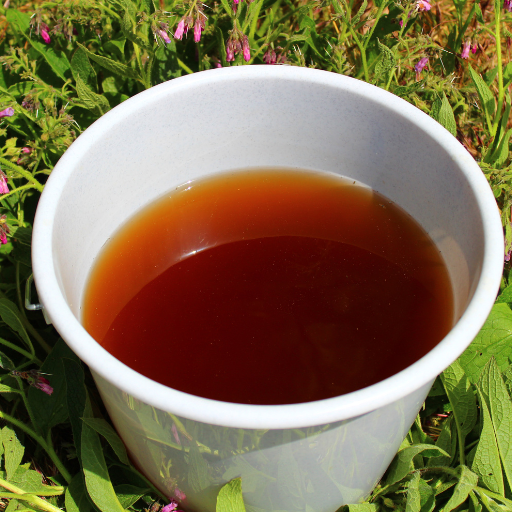
Chicken manure tea represents a fluid kind of natural fertilizer which results from the immersion of chicken droppings in water. This method helps to extract vital nutrients including potassium, phosphorus, and nitrogen, making them soluble and easily taken by plants. It can be used as nutrition to vegetables, flowers, and other garden plants that need quick nutrient boosters for their rapid growth. It can also improve soil structure and microbial activity, improving its overall health. These natural fertility methods are environmentally friendly, and no synthetic chemicals are necessary.
Benefits Associated with Chicken Manure Tea
Chicken manure tea offers several advantages that make it a very competent organic fertilizer, among them being: firstly, it has a high amount of nitrogen content ranging from 1.5% to 6%, which is important for leafy green plant growth necessary for photosynthesis as well as healthy overall plant development. Phosphorus levels usually 1%-4% are important for root growth and flower formation. Potassium contents within the range of 0.5% to 3% promote general metabolic activities of the plant thus preventing diseases.
Apart from the nutrient composition, chicken manure tea enhances soil structure by adding organic matter, thereby improving water retention capacity and aeration properties. The microbial activity stimulated by the tea creates a more favorable environment for beneficial organisms such as these, which break down organic material, releasing nutrients so that they can be easily taken up by plants. Typically, the pH level of chicken manure tea varies between six and seven hence not causing problem(s) relating to soil acidification when it comes to growing different types of crops.
Furthermore, because it is a liquid-based type of fertilizer made out of chicken waste products, plants quickly take up the most needed food, providing immediate advantages. It may be utilized either by foliar spraying or drenching, depending on what exactly needs to happen on your farm at that time. In addition, its multi-purpose use and ecological safety make chicken manure tea valuable in any organic farming.
How Does Chicken Manure Tea Make Plants Grow?
Chicken manure tea enhances plant growth by providing a rich source of nutrients, mostly nitrogen, phosphorous and potassium. These three nutritional elements support rapid foliage growth, strong root development, and better resistance against diseases, respectively. Meanwhile, the tea contains organic matter that helps improve soil structure, promoting good water retention and air exchange inside it. This is because there are more microbes in the soil, resulting in easy availability of every nutrient that plants require for optimal growth. For example, when this liquid fertilizer is used plants have their life improved through immediate uptake of nutrients.
How Do You Make Chicken Manure Tea?
Collect fresh or aged chicken manure to make chicken manure tea. You’ll need about one part manure to ten parts water. Placing the manure in a porous container such as a burlap sack or fine mesh bag, tying it with a tie or clip is ideal. Place this bag into a large bucket or container filled with water. But be sure to mix occasionally over 2-3 weeks for even nutrient distribution. Once you have finished steeping the tea, remove the bag and dilute it to reach a light brown/yellow color by adding some more water into it. Then apply it directly around your plants as soil drenching irrigation of as foliar spray. It’s always important to conduct patch tests before using any plant products on many crops to avoid plant burning from application.
Materials you will need for Making Chicken Manure Tea
For making chicken manure tea, you need fresh or aged manure from chickens, a big bucket, a sack made of burlap or netting material where you put the excreta, water, and a fastener like a clip or tie to close the sack tightly while brewing your tea. Additionally, during soaking time, a mixing stick can be used sometimes. These items will facilitate the production of nutritious fluid, which can enhance the growth and healthiness of your plants.
Step-by-Step Guide on How to Make Chicken Manure Tea
- Collect Materials: Fresh manure from chickens, a big bucket or container, a burlap sack or fine-meshed netting sack/ bag, water, and a fastener like a clip/tie for securing the bag should be acquired.
- Prepare the Manure: Put this chicken dung into a sack made out of either burlap cloth or fine meshed network material such that no spillage happens when we tie it up properly.
- Submerge and Steep: Immerse the full sac in a large bucket or container filled with water in a ratio of approximately one part manure to ten parts water.
- Steeping Process: Leave it for about 2-3 weeks, during which time the mixture may be stirred occasionally to ensure an even distribution of nutrients.
- Dilute the Tea: Remove the tea bag from its steeping and inspect its color. Hence, dilute this concentrated solution using some amount of water until it turns light brown or yellow to ensure safety when applying it to plants.
- Application: Put diluted chicken manure tea directly into your plant’s soil as a fertilizer or use it as foliar spray. A test must be done on an area before use on the entire field as it helps prevent plant burning.
How long should you brew chicken manure tea?
Generally, chicken manure tea should be brewed optimally for around two to three weeks. During this period, manure decomposes well releasing important nutrients into water. It is, therefore, advisable to stir regularly throughout the brewing process so that nutrients can be evenly distributed. Going past 3 weeks while letting them brew will cause too strong a concentration that must first be diluted before spreading to avoid harming any plants because they would get damaged. Optimal thinnest color can also help regulate how much dilution has been done if necessary making right prior to application into garden beds by monitoring it closely.
How Do You Apply Chicken Manure Tea in Your Garden?
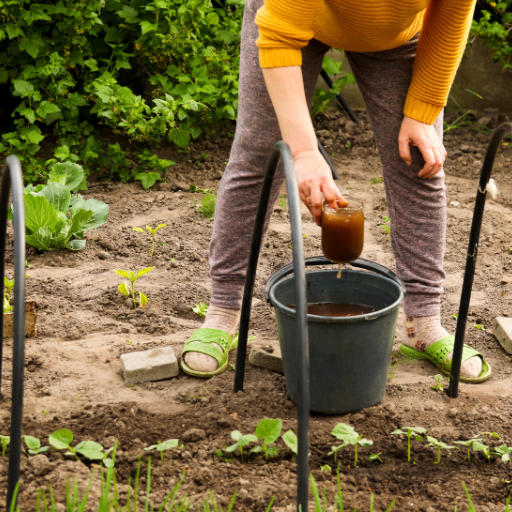
Applying chicken manure tea to your garden, ensure that the tea is diluted properly to a light brown or yellow color. After diluting the tea, it can be applied directly to the soil by pouring it at the plant base; ensure that you reach out to the root zone where nutrients are absorbed effectively. Use it on your plants as a foliar spray, alternatively, this helps plants absorb nutrients through their foliage. Before going full-scale, you should carry out a small test application first in order to check for any adverse reaction. It should be reapplied every two weeks during growing season for best plant health.
How to Dilute Chicken Manure Tea Before Use
- Dilution Ratio: The recommended dilution ratio is 1 part chicken manure tea to 10 parts water. This ensures a balanced nutrient concentration that is less likely to harm plants.
- Mixing Procedure: Mix well enough to facilitate the even distribution of nutrients within the diluted solution. Combine tea with water using a clean container.
- Color Check: A diluted tea should be of light brown or yellow coloration if too dark add more water for further dilution.
- Application Guidelines: Apply diluted tea straight onto plant bases or use it as foliar sprays; make sure your nozzles can let fine solutions through.
- Monitoring and Adjustments: After the initial application, watch out for signs of the plants’ reaction(s). In subsequent applications, increase dilution ratios if there appears any sign of nutrient burn or stress so as not to cause troublesome nutrient deliveries.
Proper Techniques to Apply Manure Tea
To apply manure tea correctly, start by ensuring the soil is adequately wet before you apply it since this facilitates better nutrient uptake. They should either be applied directly to the soil around the plants or used as a foliar spray. If you decide to use a foliar spray, ensure the solution is fine enough for your spray nozzle not to clog by doing this early in the morning or late in the evening when there will be no leaf burn due to sun. During growing season, apply tea every two weeks. After application, it is important to monitor your plants, looking for signs such as leaf burn or unusual growth patterns, which may indicate over-fertilization, and adjust dilution or frequency accordingly.
When to Use Chicken Manure Tea for Best Results?
In the main planting season, when plants are growing actively, usually between early spring and late summer, is the best time for using chicken manure tea. It is most important when first planting and during periods of fast growth before flowering or fruiting to guarantee that plants get the nutrients they need. Apply every two weeks if possible but adjust according to plant response and soil nutrient levels. To achieve better absorption of nutrients, avoid applying during very hot or dry weather conditions and ensure sufficient soil moisture exists before every application.
Is Using Chicken Manure Tea Safe?
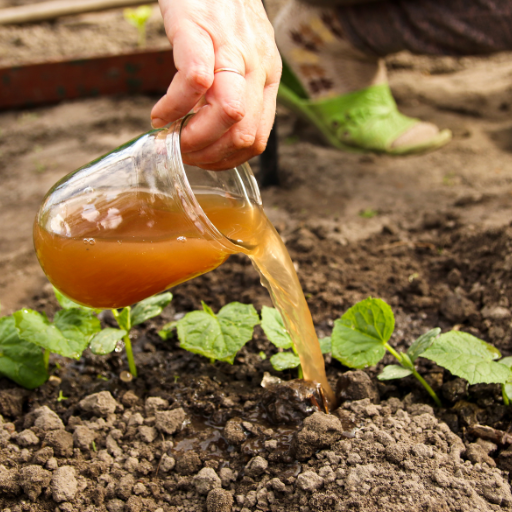
Whether or not it is safe to use chicken manure tea largely depends on the methods used in preparing and applying it. Like other animal wastes, chicken manure can harbor harmful bacteria such as E. coli and Salmonella; therefore, it must be composted properly at high temperatures before making the tea. This procedure significantly reduces pathogen counts. But even so, while fresh manure should never be placed directly on edible plants, correctly brewed chicken manure tea could be considered garden-safe. People should also have gloves when handling such waste thus they don’t pour this water onto edible parts of plants close to harvest time because this may lead to health complications if they are consumed later without thorough washing.
Potential Risks and Pathogens
Possible risks when using chicken manure tea relate mainly to dangerous pathogens like E. coli, Salmonella, and Campylobacter, which can cause serious illnesses either through contact with edible plants or due to inadequate processing and improper use of the dung tea. Composting must be done well to reduce these risks by subjecting the dung to temperatures over 130°F for several weeks, ensuring the destruction of the pathogens’ cells.These sources suggest that poultry manure should be aged for at least six months to minimize potential bacteria build-up.
The adoption of personal hygiene techniques during preparation as well as application would reduce pathogen contamination. This can involve wearing gloves or using separate tools for mixing/composting and placement/application during harvesting period just against which any produce comes in contact with soil surface material including a ninety-day break from last usage of manure tea before harvesting begins is given always allowing one hundred twenty days between the last application of slurry and crop harvests are made for crops not touching earth surfaces like fruiting plants.Always make sure that you wash your fruits properly before eating them.
Also, the acidity levels of chicken droppings-derived liquid fertilizer need careful monitoring since extremely low or high pH levels can either degrade useful microorganisms or fail to suppress harmful ones. Ideally, the pH should be maintained around neutral (pH 6-7) for optimum microbial activity and safety.
Safety Precautions When Handling Fresh Chicken Manure
The proper approach to handling of fresh chicken manure entails wearing gloves, masks, and eye protection as personal protective equipment (PPE) to avoid getting in contact with the poop directly and inhaling dust particles. Therefore, such practices decrease the risk of exposure to pathogens and allergens prevalent in chicken droppings.
To prevent contamination, it is important to maintain appropriate storage conditions. The place where chicken manure is kept should be covered; a dry area is preferred over a wet one because it would cause loss of nitrogen and bacteria multiplication. Once stored for some time, the closed environment should also have openings so that air can pass through it without accumulating dangerous gases like ammonia, which comes from this dung. Stored manure runoff must be contained and treated before any environmental pollution occurs.
To ensure pathogen destruction, keep a temperature range between 130°F (54°C) and 150°F (65°C) during composting for at least three days; this will take care of any possible infection agents. Regular turning assists in heat uniformity throughout the compost pile and promotes aerobic environment necessary for effective decomposition process. It’s also crucial to monitor moisture levels, with a good rule being if squeezed by hand, there should not be much water coming out, thus moist like a wrung-out sponge, but not enough so that it becomes an anaerobic composting system.
In addition, the carbon-nitrogen ratio (C:N) must be adjusted to attain optimal composting. Chicken manure usually has a lot of nitrogen; thus, carbon-rich materials such as straw and sawdust are necessary for an approximately 30:1 C:N ratio. This allows fast microbial decay and also helps control odors.
These safety guidelines and technical aspects will facilitate the safe handling and utilization of fresh chicken dung, reducing health risks while improving compost quality.
How Not to Burn Your Plants
- Composting Duration: The manure should be allowed to decompose for at least six months so that its high nitrogen content is adequately broken down and converted into a more stable form.
- Application Rates: Apply the composted manure at 20 pounds per every 100 square feet of garden beds, which will help keep nutrient levels manageable and reduce chances of burning.
- Dilution: If using chicken manure in liquid form, dilute it with water at a ratio of 1:15 before applying it on the farm. This reduces chances of nutrient overload.
- Soil Integration: Mix up with topsoil composted manure over the first inches of soil (6-8). This ensures there is even distribution of nutrients instead of having excessive concentrations which could damage plant roots.
- Timing: Apply the composted manure during early growing season so that plants can absorb nutrients efficiently during their peak growth time.
What Are the Best Practices for Using Chicken Manure Tea?
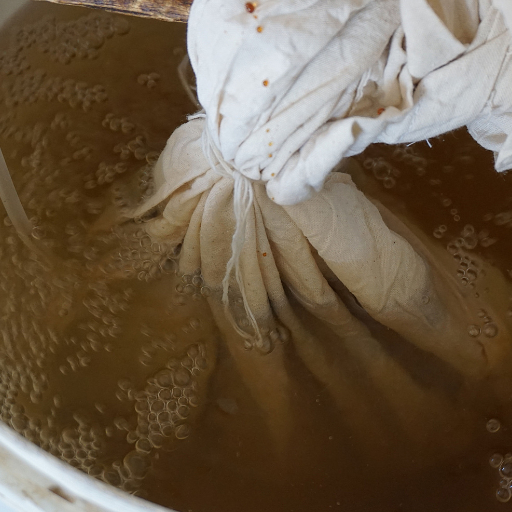
Use these best practices while working with chicken manure tea to ensure that it is safe and beneficial for plant growth. First, steep the chicken manure in water for about 24-48 hours. This steeping period makes water rich in nutrients due to leaching from the animal waste present. The next step is straining the mixture to remove any solids present so there will be no blockage when using a sprayer. It should be applied to maintain the root system instead of spraying on leaves as a soil drench. Additional reapplications every 2-4 weeks throughout the growing season ensure nutrient levels are kept up, otherwise nutrients may run out.
Which Plants Benefit Most from Chicken Manure Tea?
- Vegetable Crops: Chicken manure tea has numerous benefits on various vegetable crops like tomatoes, peppers, cucumbers and squash among others. These plants thrive because they have got high nitrogen, which cause rapid leafy growth and increase fruit production.
- Leafy Greens: Leafy vegetables such as lettuce, spinach, and kale get much value from chicken manure tea. It provides a full profile of nutrients necessary for lush foliage, resulting in higher yields and healthier plants.
- Berry Bushes: Berry-producing plants, including strawberries, raspberries, and blueberries, respond well to chicken manure tea as a source of added nutrients.Fertilized soil enhances strong roots, leading to more fruit sets and better-quality berries.
- Flowering Plants: Roses, marigolds, and petunias are some annuals or perennials that show increased performance after the application of chicken manure tea. Extra nourishment is vital for healthy development and long-lasting flowers.
- Fruit Trees: Periodic treatment with chicken manure tea helps apple, peach, and citrus trees.The slow-release nutrient mechanism sustains the tree’s growth and productivity, resulting in a healthy tree and abundant harvests.
- Herb Gardens: Some herbs, such as basil, parsley, cilantro, and mint, benefit from chicken manure tea’s balanced nutrient delivery.The tea helps support soil fertility, which in turn enhances robust growth and higher essential oil concentrations, resulting in improved flavor and aroma.
How Often Should You Use Manure Tea?
Frequency for using manure tea varies with plant type and stage of growth. A general rule is applying manure approximately every 2-4 weeks during the growing period as cited in primary sources. Regarding vegetable crops, feeding after every three weeks would be ideal because it supplies nutrients consistently without overwhelming them. Apply once a month for flowering plants or berry bushes to keep them strong and blooming well. In the case of fruit trees on average every four to six weeks should be enough for fruiting seasons.
For many applications, technical parameters show that a dilution ratio of 1:10 (one part manure tea to ten parts water) is normally a good one to use because it ensures nutrient supply without destroying the roots. In addition, the manure tea should be applied at the base of the plant and not onto its leaves so as to avoid possible leaf destruction. Nutrient absorption is enhanced by uniform soil moisture after application. Soil health as well as plant response can be regularly monitored since this will help in fine-tuning both frequency and concentration of applications for optimum plant health and productivity.
Different Forms of Chicken Manure Fertilizer
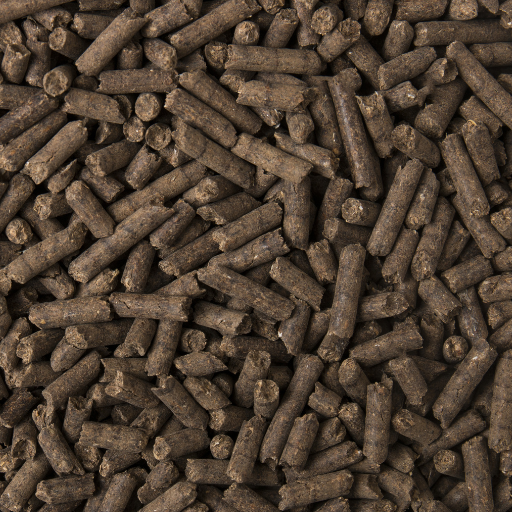
Chicken manure fertilizer is available in several forms serving very specific agricultural requirements and applications. However, it requires handling with care so as to prevent root burn. It must be composted to kill pathogens and reduce its high nitrogen content. Composting chicken manure takes it through decomposition, rendering it safe for direct plant application. It makes soil structure better while offering a balanced nutrient profile. Granulated or pelletized chicken manure is processed and dried, making it a convenient form that is easy to apply, reduces odor, and allows for controlled nutrient release. Liquid chicken manure, often called manure tea, is a diluted solution for instant nutrient uptake and foliar feeding. Depending on the precise horticultural need, these types provide flexibility when improving soil fertility.
Using Compost Made from Chicken Manure
Due to its rich mineral composition, chicken manure-made compost boosts soil aeration, water holding capacity, ion exchange capacity, organic matter content, and beneficial microbial activity. For efficient use of chicken-manured compost, some guidelines should be followed based on some technicalities associated with it . Firstly proper composting involves achieving a carbon-to-nitrogen ratio (C:N) of about 30:1 which provides favorable conditions for the activity of microorganisms involved in decay processes.The pile should reach temperatures between 130°F and 150°F for at least three consecutive days in order to destroy pathogens and deter viable seeds.
When applying chicken-manured compost, approximately 1-2 inches can be incorporated into the top 6-8 inches of soil depth. This will ensure nutrient availability throughout the field and stimulate good root development. Again, soil pH should be monitored since chicken naturally produces high levels of nitrates, affecting soil acidity.A pH range between 6.0 and 7.5 is best suited to maintaining soils at optimal plant health.
Proper application timing is also vital. Composting done in fall allows it to mix well with the soil throughout winter thus enhancing soil fertility for spring planting. However, if this is to be done during spring, it should occur at least three weeks before planting so as to prevent nitrogen burn and ensure seedling safety. It is important to use regular soil tests that can assist in refining compost application rates and maintaining soil fertility based on crop requirements and soil condition.
Benefits of Pelletized Chicken Manure
Pelletized chicken manure offers several distinct advantages over raw or loosely composted manure, primarily due to its easy handling, consistent nutrient availability, and reduced odor. The manure’s pelletization involves processing it into concentrated, easy-to-apply pellets, extending its utility across different agricultural practices.
- Nutrient Density and Stability: Pelletized chicken manure contains more nutrients than raw manure, hence the steady release of important elements like nitrogen (N), phosphorous (P), and potassium(K). Usually, pelletized manures have a balanced N-P-K ratio that is good for most crops, such as 4-2-2, for uniform application of nutrients. The process often ensures little loss of nutrients, unlike loose composts.
- Ease of Application: Pelletized manure’s convenience ranks among its greatest advantages. Using normal farming equipment, all pellets can be spread equally, thus contributing to evenness in conditioning soils and fertilization. This distribution helps avoid nutrient hotspots or under-fertilized areas caused by uneven spreading associated with fresh manuring practices.
- Reduced Pathogens and Weed Seeds: The pelletizing process uses a high-temperature treatment, which reduces the presence of pathogens and weed seeds in the manure. This step is vital for biosecurity purposes in agriculture as it can help mitigate plant diseases and unwanted vegetation that may be competing for resources with crops.
- Improved Soil Structure: Pelletized chicken manure enhances soil structure through improved aeration and water retention implications. Microbial activities are fostered by organic material in pellets, slowly breaking them down over time to improve physical properties of the soil. This natural process of decay is good for the soil’s long-term health.
- Odor Control: Converting raw manure into pellets significantly reduces the strong odor associated with chicken manure, which makes it particularly advantageous, especially close to residential zones or among farmers who are cautious about the effect of manure application on the environment.
Comparing Fresh, Composted, and Pelletized Chicken Manure
- Nutrient Content:
-
- Fresh Manure: has high nitrogen, phosphorus, and potassium levels, though its direct application risks burning plants due to too much concentration.
- Composted Manure: Well balanced nutrient profile; composting stabilizes nutrients making them more available for plant uptake and reducing chances of nutrient runoff.
- Pelletized Manure: Concentrated nutrients like fresh manure but in a stabilized form that allows controlled release over time.
- Application and Handling:
-
- Fresh Manure: It needs careful handling to avoid contamination and must be aged or composted because of high moisture content and strong smell before use.
- Composted Manure: Less bulky with low volume thus easier to manage than fresh one; can be spread by basic equipment although might not be as compact as pelletized ones.
- Pelletized Manure: The most user-friendly option with low moisture content, minimal odor and can be applied through normal machinery. It ensures uniform spread and equal distribution of nutrients.
- Pathogen Content and Biosecurity:
-
- Fresh Manure: High risk in cases of pathogens and weed seeds that require appropriate management for safety purposes.
- Composted Manure: Lesser pathogen levels from the thermophilic phase of composting in which manures are heated to temperatures that can kill most pathogens and weed seeds.
- Pelletized Manure: Additional sterilization is carried out during a high-temperature pelletizing process, thus reducing further risks from pathogens and weed seeds.
- Impact on Soil Structure:
-
- Fresh Manure: Although it can improve soil structure over time, some initial difficulties may emerge if it is incorrectly used or immaturely applied.
- Composted Manure: The addition of organic matter improves both aeration and water retention, thereby enhancing soil structure and encouraging microbial activities.
- Pelletized Manure: Similar advantages to composted manures but with a slow release of organic matter that gradually helps improve soil structure.
- Odor Management:
-
- Fresh Manure: Strong smell which is offensive and may cause complaints in residential areas whenever used thereupon.
- Composted Manure: Compared to fresh manures, the smell has been reduced significantly, so it can be used more or less in populated areas
- Pelletized manure: This would be a preferred alternative for extensive farming operations because it does not have much odour especially near residential zones.
Reference sources
- Fresh Eggs Daily
- Source: How To Brew Chicken Manure “Tea” for your Garden
- Summary: This source provides detailed instructions on how to brew chicken manure tea, outlining the benefits and the process involved. It discusses the presence of beneficial microorganisms, enzymes, and organic matter that enhance soil fertility, thereby confirming the feasibility of using chicken manure tea as an effective organic fertilizer.
- Plantwise Knowledge Bank
- Source: Preparation of Tea Manure from Chicken Droppings
- Summary: This article discusses the preparation of tea manure from various types of manure, including chicken droppings. It emphasizes the rapid provision of nitrogen and other essential nutrients to the soil, supporting the practical application of chicken manure tea in organic farming.
- The Frugal Chicken
- Source: Use Chicken Manure Tea In Your Garden For Healthier Plants
- Summary: This source explores the use of chicken manure tea as a potent plant fertilizer. It details the nutrient content and benefits of using chicken manure tea to enhance plant growth and soil health, validating its feasibility and effectiveness in organic gardening practices.
Frequently Asked Questions (FAQs)
Q: What is chicken manure tea and why should I use it?
A: Chicken manure tea, often referred to as chicken poop tea, is an organic fertilizer made by steeping chicken manure in water. It provides essential nutrients for plants and can significantly benefit your vegetable garden by offering a natural, nutrient-rich boost.
Q: How do I make chicken manure tea?
A: To make chicken manure tea, fill a bucket with water and place chicken manure in a pillowcase or similar container. Submerge the pillowcase in the water and let it steep for a few days, stirring occasionally. This creates a potent compost tea ready for your garden.
Q: How often should I use chicken manure tea?
A: Use chicken manure tea approximately every two weeks during the growing season. This helps ensure that your plants are consistently supplied with the nutrients they need without overwhelming them.
Q: Can chicken manure tea be used on all plants?
A: Yes, chicken manure tea can be used on a variety of plants, but it’s especially beneficial for heavy feeders like vegetables and fluted pumpkin plants. However, always dilute the tea with water if it appears too strong to avoid potential harm to more delicate plants.
Q: Is chicken manure tea safe for edible plants?
A: Yes, chicken manure tea is safe for edible plants as long as you properly compost and dilute the tea. This ensures that any harmful pathogens are minimized, making the tea a great organic way to fertilize your vegetable garden.
Q: What are the benefits of using chicken manure tea over other fertilizers?
A: One of the highest benefits of using chicken manure tea is that it provides a balanced mix of nutrients and improves soil structure. Additionally, it is a sustainable and eco-friendly way to fertilize your garden, especially if you have backyard chickens.
Q: How do I apply chicken manure tea to my garden?
A: To apply chicken manure tea, dilute it to a weak tea if necessary (1 part tea to 10 parts water) and pour it around the base of your plants. You can also use it as a foliar spray for a quick nutrient boost.
Q: What precautions should I take when making and using chicken manure tea?
A: Always wear gloves when handling chicken poop, and ensure your tea is properly composted to reduce any health risks. Avoid using overly fresh manure, and keep the tea well-aerated by briskly stirring with a stick to prevent harmful anaerobic bacteria from developing.
Q: Can I use chicken manure tea in conjunction with other fertilizers?
A: Yes, chicken manure tea can be used alongside other organic fertilizers for a more comprehensive nutrient profile. Just be mindful of not over-fertilizing, which can harm your plants.
Q: What else can I do with chicken manure?
A: Aside from making manure tea, you can add chicken manure to your compost pile to create rich, composted soil. This organic fertilizer is great for use in various garden applications and helps maintain a healthy, vibrant vegetable garden.






